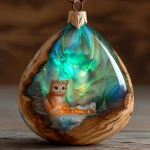Explore the Best AI Image Gallery

Beyond Canvas and Code: Blockchains Transformative Touch on the Creative Industry
The intersection of blockchain technology and the creative industry is a burgeoning landscape brimming with possibilities. From digital art to music licensing, blockchain offers a decentralized and transparent system that can empower creators, redefine ownership, and foster innovative collaborations.
Reimagining Ownership and Copyright
One of the most significant impacts of blockchain on the creative industry is its potential to revolutionize copyright protection and ownership. By leveraging the immutable nature of blockchain, digital artworks, music compositions, and literary works can be permanently recorded with verifiable proof of creation and ownership.
This eliminates the need for intermediaries like copyright agencies and reduces the risk of plagiarism or unauthorized distribution. Creators can directly upload their work to a blockchain platform, establishing a permanent record of their intellectual property.
NFTs: A New Frontier in Artistic Expression
Non-fungible tokens (NFTs) have emerged as a game-changer in the digital art world, enabling creators to tokenize unique digital assets and sell them as indivisible units. Each NFT is stored on the blockchain, guaranteeing its authenticity and provenance.
This has opened up new avenues for artists to monetize their work directly, bypassing traditional art market gatekeepers. The rise of NFTs has also fostered a thriving secondary market where collectors can buy, sell, and trade digital artworks, further empowering creators.
Smart Contracts: Automating Creative Transactions
Smart contracts, self-executing agreements stored on the blockchain, are poised to streamline creative industry transactions. They can automate royalty payments to artists when their work is used, ensuring fair compensation for their contributions.
Imagine a scenario where musicians automatically receive royalties every time their song is streamed or downloaded, eliminating the need for complex contracts and intermediaries. Smart contracts can also facilitate licensing agreements for creative works, making the process more transparent and efficient.
Ethical Considerations and Challenges
While blockchain technology offers immense potential for the creative industry, its crucial to address the ethical considerations and challenges associated with its implementation:
- **Data Privacy and Security:** Blockchain platforms must prioritize user data privacy and security. Creators need to be confident that their personal information and intellectual property are protected.
- **Accessibility and Inclusivity:** Its essential to ensure that blockchain technology is accessible to all creators, regardless of their technical expertise or socioeconomic background.
- **Environmental Impact:** Some blockchain networks consume significant energy, raising concerns about their environmental footprint. The industry needs to explore more sustainable solutions.
Future Trends: A Glimpse into the Blockchain-Powered Creative Landscape
The future of the creative industry is inextricably linked with blockchain technology. Here are some emerging trends to watch:
- **Decentralized Content Platforms:** We can expect to see more decentralized platforms that empower creators to own and control their content, fostering a more equitable and transparent ecosystem.
- **Immersive Experiences:** Blockchain can enhance immersive experiences like virtual reality and augmented reality by enabling verifiable ownership of digital assets within these environments.
- **Tokenized Funding for Creative Projects:** Platforms will emerge that allow creators to raise funds directly from fans and supporters through tokenized offerings, democratizing access to capital.
Conclusion
Blockchain technology is poised to fundamentally transform the creative industry, empowering artists, fostering transparency, and redefining ownership. While challenges remain, the potential benefits are vast. As the industry embraces this transformative technology, we can anticipate a future where creativity flourishes in a decentralized and equitable landscape.




](https://images.ai-img.art/thumbnails/150/7599c9e7507c77a975081d554947c9dea123e678a7ece42d30f571f639620598.webp)


](https://images.ai-img.art/thumbnails/150/031692dcf8fbf869092e8cea50f9411a45dadc1f189ea67b8dece8e02952a7e3.webp)




](https://images.ai-img.art/thumbnails/150/efd8a9ad06ef2c72e3378698ad5e592d3d2bf8eff85c25e75db7c9902c7be353.webp)